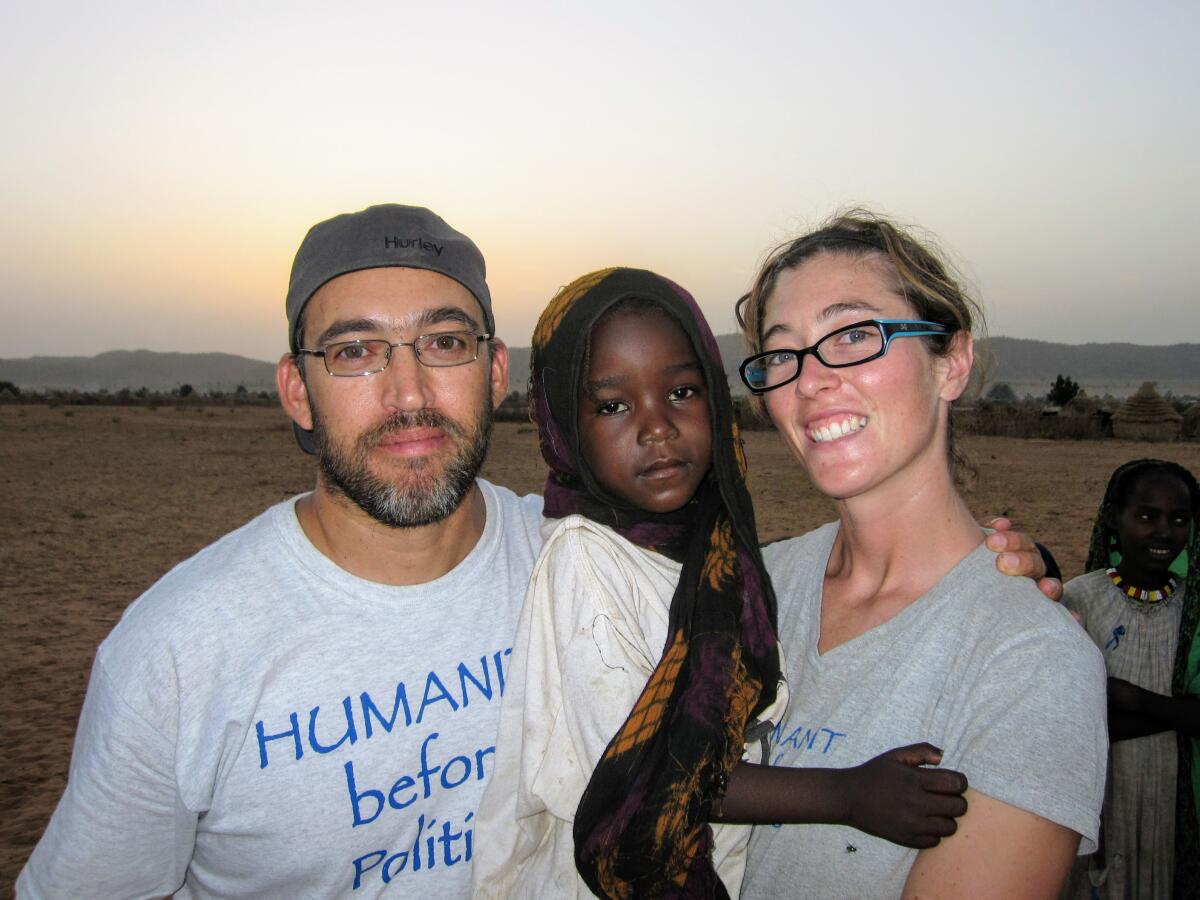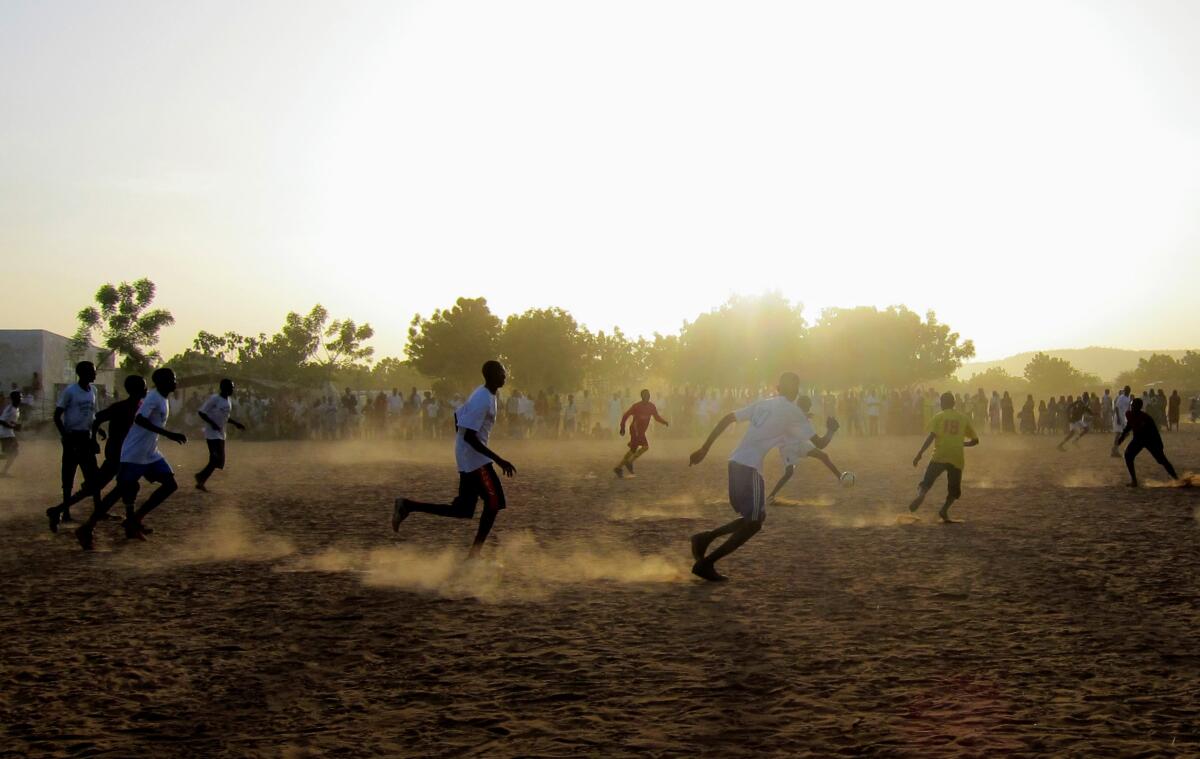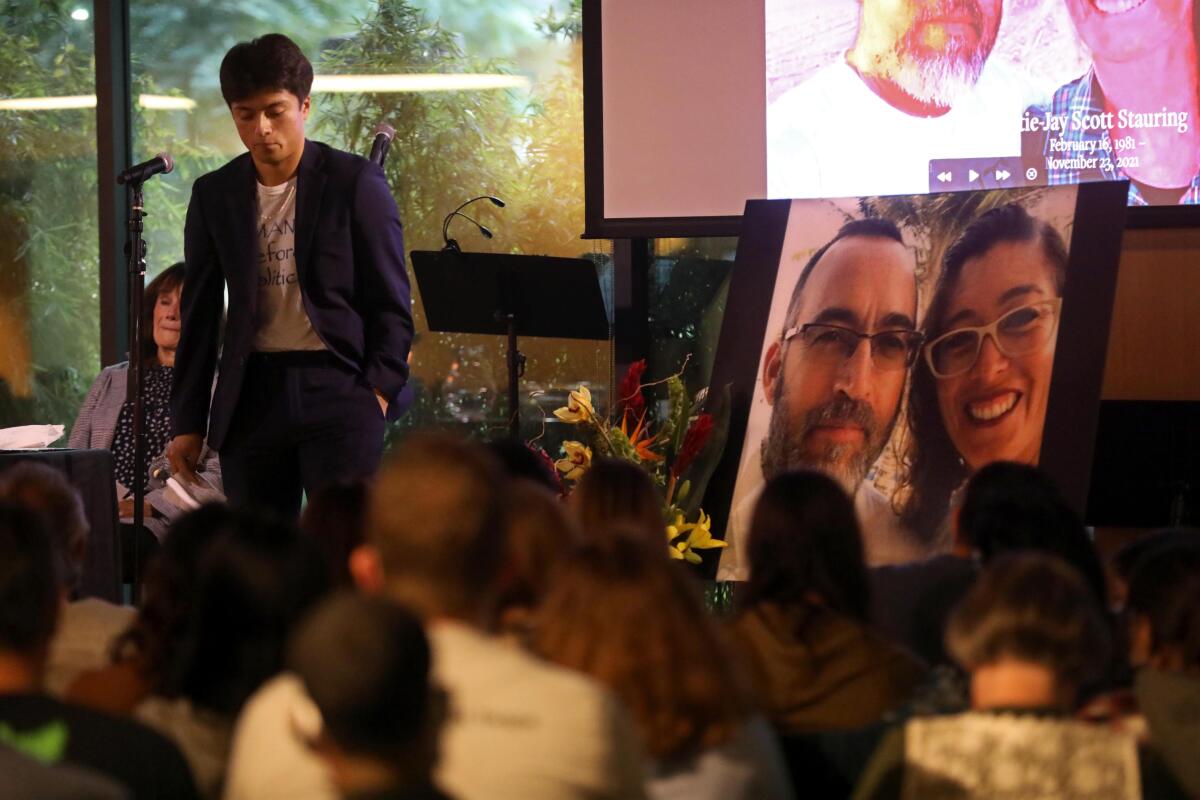A year after the death of iACT founders, their legacy continues to grow

- Share via
When a four-car accident claimed the lives of Gabriel Stauring and Katie-Jay Scott in a Manhattan Beach intersection last November, the reverberations were felt more than half a world away.
Stauring and Scott, married 11 years, had been working in refugee camps longer than that, bringing soccer — and hope — to more than 36,000 people in 20 countries. Sara-Christine Dallain, who had worked beside them much of that time, was determined not to let their lives’ work die.
“They left some breadcrumbs for us to pick up on,” said Dallain, who worked with iACT, the L.A.-based humanitarian nonprofit Stauring and Scott founded, for eight years before returning as interim executive director in January, one of two former staffers who came back to make sure the group’s mission continued. “They had left us with a new vision and mission, a strong sense of values and culture and approach.
“Now we’re looking ahead to the next 10 years. How do we continue to build a healthy and stable organization that can operate with impact, meaningfully independent of any of its founders or leaders? We’re working toward that right now.”
A Redondo Beach couple who offered Darfur refugees hope and a way out via soccer are killed in a four-car traffic accident in Manhattan Beach.
Part of that new vision could soon take iACT to migrant communities in Mexico for the first time. Under Stauring and Scott, who made more than three-dozen trips to refugee camps in Chad, Tanzania, Cameroon and the Central African Republic, iACT’s work, which uses soccer to teach teamwork, respect, responsibility and pride, had largely centered on Africa. But in recent years, as the global refugee population doubled to more than 84 million, iACT’s reach necessarily expanded to Greece and Armenia, people whose lives have been suddenly and irreparably upended.
“We don’t empower because what we’re really just doing is creating opportunity for people to stand in their own power and to regain purpose,” Dallain said. “These men and women have lost so much. They’ve lost their homes, their jobs or educational opportunities, their community, their life as they knew it. But they didn’t lose all of the experiences and talents that they bring with them and their own aspirations.
“And so the idea is that we’re creating that bridge.”
The next bridge may be built in Mexico.
“We’ve been connecting with a lot of organizations just to make sure first is this a good fit? How can iACT actually support children and youth on the move? And what we’ve heard from local organizations is yes, this is needed,” Dallain said. “These families are coming, they’re here for sometimes days, weeks and months waiting, trying to figure out how to cross the border, or what to do next. They are showing up with all they can carry on their back. And it would be absolutely essential if there could be a safe and joyful space for children to play every day and to learn and to come together while they’re there.”

In African refugee camps, where many children have spent their entire lives, soccer academies have been set up to accommodate up to 2,000 children, who train or play for up 90 minutes a day, five to six days a week. But in addition to soccer skills, the academies also teach the children how to advocate for themselves.
“iACT changed the behaviors of my community,” said Oumda Alfateh Younous Haroun, a refugee since 2003 and a program coordinator who oversees the group’s work at 11 camps in Eastern Chad. He is one of 188 coaches, teachers or support staff iACT supports financially.
“They asked us what we needed,” he continued. “If you want to change any community, don’t just focus on what you brought to them. No, you should ask them want they need. We told them that we need education, we need soccer and we need justice.”
iACT, which has a Southern California-based staff of four and an annual budget of about $1 million, may have found a willing partner for its Mexico expansion in Angel City FC, the first-year NWSL team with a social conscience. .

The team’s unique business model dictates that 10% of the value of each sponsorship go directly to community impact work, which resulted in donations of just more than $1 million combined in 2022. Some of that money could soon find its way to iACT.
“We have pretty expansive impact programs at this point. And we have found a way within our story to make sure that it’s authentic to us,” said Catherine Dávila, Angel City’s head of community. “But obviously if it is soccer, that’s such an easy one for us to say, ‘This is what we’re about.’ So iACT makes tons of sense on that front.
“But the thing that’s most exciting is the way that they go about it and the fact that they really embed themselves in those communities to create something that’s self-sustaining. That’s the piece that’s remarkable. It’s not a one-off, it’s not ‘throw some money at it and run a soccer clinic.’ It’s jobs, it’s training and that’s tremendous, especially in something like a refugee camp. People think of it being transient. And so often it is not.”
Redondo Beach’s Gabriel Stauring and Katie-Jay Scott are determined to grow the Refugees United Soccer Academy, which teaches soccer and life skills to displaced Darfuri people and other refugees.
As the one-year anniversary of the Nov. 23 crash approaches, an accident that also took the life of Christian Mendoza, an elementary school principal Dallain said she feels both sadness and pride. Sadness over the deaths of Stauring and Scott, but pride over being able to continue, even expand, the vision the two had when they first traveled to Africa together in 2008.
“It’s been remarkable and a beautiful testimony to the legacy of Gabriel and KJ. The organization has managed to accomplish a lot these past 10 months because of the community they built,” said Dallain, who said iACT’s work will reach 13,000 children in the Refugees United Soccer Academies this year. “Because of their leadership and focus, the staff, our refugee team members, our board members, our volunteers, are capable and equipped to bring iACT forward and to continue the organization’s vision.
“So many people were touched by KJ and Gabriel. So many people from all walks of life felt so connected to the mission. To know them was to feel kind of seen and heard and loved and included. We all have come together to ensure that it continues — not only to continue their legacy but truly to continue the important work that we also believe in.”









